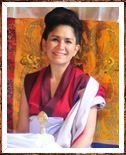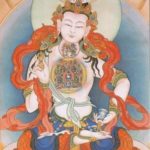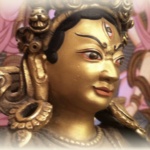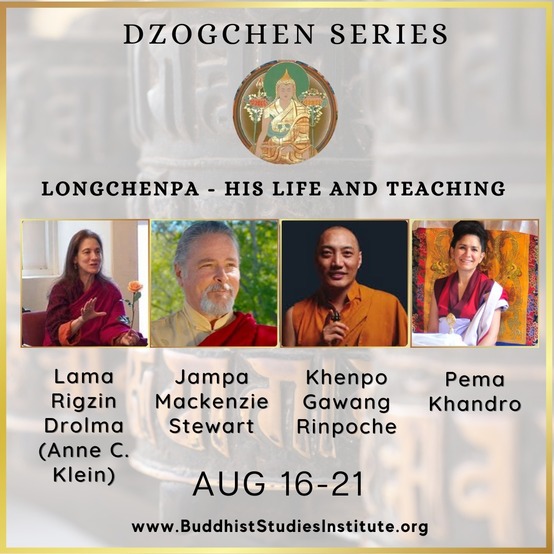Letter from Pema Khandro
“When the fog of excessive conceptualization enshrouds you, consult these noble works, and the vajra of timeless awareness found in the Omniscient One’s excellent explanatory teachings will knock down the walls of concepts based on confusion.”

Dear Dharma Friends,
We are preparing for a celebration of Dzogchen next week. You may remember that Dzogchen Heart Essence transmissions started with a woman and a little girl, the first two recipients of the lineage from Padmasambhava. The first to receive it was Yeshe Tsogyal and then Pemasel. According to the legend, in his past lives, the great master Longchenpa first received the Dzogchen teachings as a young girl, Pemasel, who died at an early age. She was revived but only for long enough to receive a transmission from Padmasambhava and a commitment to reveal those teachings in a future life. Then in his next life that young girl reincarnated as a male treasure revealer, but who lived an obscure life, Pema Ledreltsal. After that, she became Longchenpa (1308- 1363) a male scholar and yogin, the greatest forefather of Dzogchen. His history is a fascinating glimpse into how Tibetan Buddhists understand identity, as layered with multiple pasts and futures in cycles of reincarnation. In these legends, names, gender, time, place and context change, but the transmission is thought to be a continuous thread from the past to a new present.
In Longchenpa’s life in the fourteenth century, he is known for his great works synthesizing and systematizing the Dzogchen teachings. I think of his work, the Treasury of Philosophical systems, which painstakingly lays out the relationship between Dzogchen and previous Buddhist philosophical vehicles as well its relationship to Sarma assertions. Here we can see a dialectic between different views and methods which turn earlier Buddhist philosophies on their head. For example he says,
“In lower spiritual approaches, having established confidence in a view based on mental analysis and concepts, one thinks of enlightenment in terms of some linear time frame, with ideas such as, ‘I will attain freedom in an eon, or several lifetimes, or in this lifetime or in the state after death.’ Thus, because these approaches do not enable one to perceive naturally occurring timeless awareness in the present moment, they are not entirely correct…”(1)
It is such a radical assertion to take the path as finding something that is present now rather than developed later. I find these passages refreshing because it undermines neurotic ideals of enlightenment and points to something very basic, present (and even somatic) as the goal of the path. How do we resolve these different approaches in Buddhism? The answer matters because it gets to the heart of how we conceive of diversity. In Dzogchen, diversity is part of yeshes, the luminous primordial intelligence, not counter to it. At the most crude level, and in keeping with dualistic tendencies, we could make one right and another wrong. But there are so many other frameworks available. The strategy we see in this passage is the idea of partial, or provisional truths, which are completely true and revelational from the standpoint of not knowing them, even though there is more to be known beyond that. Another one of the most common, was of reasoning through these diversities in Buddhist philosophy based on efficacy, (thabs shes) uniting the wisdom and skillful means that is actually appropriate according to the person. Another more poetic explanation comes from Longchenpa; he describes the unity of all the Buddhist methods based on sharing the same result, which is authentic freedom. (2) And there are so many other ways to understand how Buddhist philosophy has maintained these diverse approaches. Thanks in large part to Longchenpa, we can understand how they all relate to Dzogchen.
Longchenpa is most well known for his seven treasuries, the texts I teach in our weekly Wednesday night classes but his works are extensive, totaling some 250 or more works. We also study Longchenpa’s work in our annual Dzogchen retreat, which this year will happen in September on-line, due to the pandemic. There is so much to explore in Longchenpa’s works. As a result of his massive contribution, many praises are said of Longchenpa. In Marvellous Garland, he is called, the headwater of the river of teachings, the source of a hundred thousand springs, timely rain of spiritual energy and power that nurtures the field of many beings, great refuge, yogin of the sublime spiritual approach.
Dzogchen is profound in so many ways, most notably for the philosophy, the special meditation practices and the emphasis on luminous wakefulness as the fabric of person and everything. However, another thing that continuously fascinates me about Dzogchen is its teachings in context of its history. It is such an important part of what we are doing with the Buddhist Studies Institute. By looking at things in context we work against that colonialist tendency to erase indigenous contexts and traditions. And also by including the history with the study of philosophy and practice, we find resources to see from multiple perspectives and gain from the debates and struggles of those who came before us. By engaging instruction from Tibetan and Western-European scholars alike, we see Buddhism in conversations with the discourses of our time. This approach opens up a way of working Buddhism that zooms out to a wider perspective, to see more, to open up new questions with an explorer mindset. Of course, within this endeavor, one of the most compelling and precious resources is philosophical works of Longchenpa, great foreather of Dzogchen, the single most important writer of Dzogchen teachings.
This is why, next week, in lieu of our annual in-person Dzogchen retreat in August (which is now happening online in September) and in celebration of the anniversary of our school, we will be holding an online series exploring Dzogchen through the life and teachings of Longchenpa. This wonderful event will consist of evening programs led by experts in Longchenpa’s tradition and then a Saturday one day mini-retreat where I will teach on Longchenpa’s heart advice to Yogis.
I am overjoyed to be hosting our esteemed guest teachers for next week’s program. Lama Rigzin Drolma, Anne Klein, is an extraordinary scholar, practitioner and Lama. She is someone I greatly admire and I am overjoyed that you will get to meet her in this context. Jampa MacKenzie Stewart recently published a book on Longchenpa’s life. We also have Khenpo Gawang Rinpoche teaching for this event, translator of Longchenpa’s guide to meditation that we study in the monthly open teaching. And of course I will be overjoyed to teach as well, so happy to talk with you square within my speciality as a researcher and practitioner. I look forward to sharing this wonderful event with you.
I will leave you with a poem of Patrul Rinpoche about the benefits of studying Longchenpa’s teachings.
My very best to you,
Patrul Rinpoche (1808-1887) said:
“When you feel confused or ignorant or in doubt, consult these noble works,
and the sword of sublime knowing found in the Omniscient One’s excellent explanatory teachings will cut through the web of confusion.
When the fog of excessive conceptualization enshrouds you, consult these noble works, and the vajra of timeless awareness found in the Omniscient One’s excellent explanatory teachings will knock down the walls of concepts based on confusion.
When the pain of emotionality based on confusion afflicts you, consult these noble works, and the bonfire of realization found in the Omniscient One’s excellent explanatory teachings will instantly consume the fuel of negative emotions.
When you are distracted by circumstances and filled with regret, consult these noble works, and the sublime healing nectar found in the Omniscient One’s excellent explanatory teachings will soothe and restore your mind with certain emergence.
When you are dwelling in a solitary place, consult these noble works, and the comforting ally of awareness found in the Omniscient One’s excellent explanatory teachings will allow you to pass your time, day and night, in spiritual practice.
When you feel attachment and aversion in the midst of too many people, consult these noble works, and the jeweled staircase found in the Omniscient One’s excellent explanatory teachings will bring you ease of mind within the uniform expanse of being.
When you are obsessed with the concepts of intellectual speculation, consult these noble works, and the key of skillful means found in the Omniscient One’s excellent explanatory teachings will release you from the chains of belief in the seeming truth of things.
When your meditation is hindered by laxity, agitation, or dullness, consult these noble works, and the pith instructions on key points found in the Omniscient One’s excellent explanatory teachings will arouse an excellent, flawless state of peaceful meditative absorption within you.
When you are threatened by illness or suffering, consult these noble works, and the philosopher’s stone (which turns base metal into gold) found in the Omniscient One’s excellent explanatory teachings will transform negative circumstances into supportive ones.
When your realization -the dynamic energy of awareness- intensifies, consult these noble works, and the enriching key points found in the Omniscient One’s excellent explanatory teachings will directly introduce you to equalness within the expanse of dharmakaya.
When you feel uncontrollably concerned with sense pleasures and personal wealth, consult these noble works, and the peacock (which delights in poison) found in the Omniscient One’s excellent explanatory teachings will allow you to enjoy whatever you desire as an adornment, in a state without fixation.
When you feel self-important, caught on the dualistic horns of hope and fear, consult these noble works, and the means of cutting through the maras found in the Omniscient One’s excellent explanatory teachings will grant you the confidence to enjoy uncontrived conduct.
When, in an entrenched state of confusion, you reify things, consult these noble works, and the magician’s advice found in the Omniscient One’s excellent explanatory teachings will eliminate the turmoil of taking things to be so solid and real.” (3)
Footnotes:
(1) Rabjam, Longchen, grub mtha’ rin po che’i mdzod. Adzom Edition. ff181b.
(2) Rabjam, ff199b.
(3) Khenpo, Nyoshul. Marvelous Garland of Rare Gems; Biographies of the Masters of Awareness of the Dzogchen Lineage. Padma Publishing, 2005. 152-155. Adapted from this text, I adjusted the translation of a couple terms.
DZOGCHEN SERIES
DZOGCHEN SERIES Longchenpa & His Life Teachings
with Anne C. Klein, Lama Rigzin Drolma
Jampa Mackenzie Stewart
Khenpo Gawang Rinpoche
Pema Khandro
Aug 16th – 19th, 6-7:30pm PT – Guest Presenters
Sat Aug 21st, 10am-6pm PT – Longchenpa’s Advice to Yogis
w/ Pema Khandro
One of the most celebrated scholars of Tibetan Buddhism was Longchenpa, a fourteenth century philosopher-yogi who wrote about Dzogchen.
Dzogchen is the esoteric tradition of Tibetan contemplation, regarded as the highest and most precious body of knowledge held by the Nyingma tradition. It emphasizes teachings on intrinsic buddha-nature as the true nature of every person and the ground of reality. It also emphasizes a contemplative relationship with the elements and environment.
Longchenpa’s work on Dzogchen defined the tradition as it is practiced today. Longchenpa’s extensive collected works synthesized the Dzogchen teachings and their relationship to the exoteric Buddhist philosophical movements.
This series features even lectures, scholars and teachers of Tibetan Buddhism specializing in the works of Longchenpa and Dzogchen. These classes will focus on the life and teachings of Longchenpa, followed by a day-long meditation course, all online. Join us in celebrating the history of Dzogchen and reflecting on its developments, views and contributions in the life and works of Longchenpa.
*This series has a limited enrollment of 100 participants.



